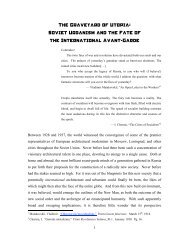MEMORIES OF THE FUTURE - The Charnel-House
MEMORIES OF THE FUTURE - The Charnel-House
MEMORIES OF THE FUTURE - The Charnel-House
Create successful ePaper yourself
Turn your PDF publications into a flip-book with our unique Google optimized e-Paper software.
SAME AS IT EVER WASFrom this perspective, then, it would appear that Peter Frase’s article on “Four Futures”this last winter is misguided, on the simple grounds that it posits four futures too many. 24<strong>The</strong>re is precisely no future to be hoped for at present. Closer to Berardi’s position by farare Salar Mohandesi and Asad Haider in their piece, “Is <strong>The</strong>re a Future for Socialism?”Mohandesi and Haider maintain that “revolutionary politics does not occur in the futuretense — it’s not a state of affairs to be established.” Cribbing a line from Lyotard, theyprefer instead to speak of “the future anterior: the real movement, the current activity ofthe proletariat which will have been the basis for the transformation of society.” 25 Thisis, as the authors freely admit, old hat. It harkens back not only to <strong>The</strong> German Ideology,which they explicitly cite, but more immediately to some of the more famous passages ofBenjamin’s “On the Concept of History.” 26 But Mohandesi and Haider rely too heavilyon the account it provides of German Social-Democracy, and read Adorno’s critiques ofprogress and the Enlightenment one-sidedly. In their haste to assimilate Frankfurt Schoolcritical theory to the practical armature of Italian operaismo, 27 they commit a number ofsloppy logical and factual errors along the way. As a result, though their essay representsa welcome corrective to inevitabilist philosophies of history (in which the future victoryof revolution is supposedly “guaranteed”), it falls well short in other respects.24 Though to be fair, Frase only really discusses two futures qua futures — i.e., as substantial departuresfrom the present. Insofar as what he calls “rentism” (hierarchy + abundance) and “exterminism” (hierarchy+ scarcity) already exist throughout most of the world, these would just be continuations of the present.But this is quibbling. Frase, Peter. “Four Futures.” Jacobin. Winter 2012. Pgs. 27-34.25 Mohandesi, Salar and Haider, Asad. “Is <strong>The</strong>re a Future for Socialism?” Jacobin.<strong>The</strong> line, which the authors leave unattributed, runs as follows: “Postmodern would be understandingaccording to the paradox of the future (post) anterior (modo).” Lyotard, Jean-François. “An Answer to theQuestion: What is the Postmodern?” Translated by Julian Pefanis and Morgan Thomas. <strong>The</strong> PostmodernExplained: Correspondence, 1982-85. (University of Minnesota Press. Minneapolis, MN: 2003). Pg. 15.26 “[<strong>The</strong> angel of history’s] face is turned toward the past…But a storm…drives him irresistibly into thefuture.” Or later: “<strong>The</strong> Jews were prohibited from inquiring into the future: the Torah…instructed them inremembrance.” Benjamin, Walter. “On the Concept of History.” Translated by Edmund Jephcott.Selected Writings, Vol. 4: 1938-1940. (Harvard University Press. Cambridge, MA: 2006). Pgs. 392, 397.27 As hinted at by their repeated offhand endorsements of Mario Tronti’s “strategy of refusal.”9






